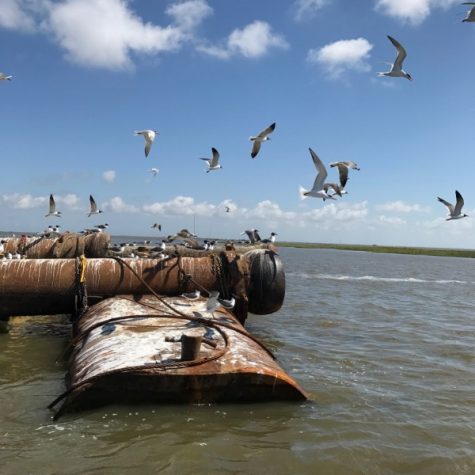Your donation will support the student journalists of Tulane University. Your contribution will allow us to purchase equipment and cover our annual website hosting costs.
Rolling on the River: Louisiana team wins competition to build floating school, partners with Cowen Institute
April 27, 2017
When the school year begins in the fall of 2018, students will be filing into traditional classrooms across the country. New Harmony High School students, however, will be attending their classes on a barge on the Mississippi River.
New Harmony will be a mobile school on a Mississippi River barge, providing a hands-on curriculum broken down into three components: coastal restoration, individualized learning plans and completion of Louisiana graduation requirements.
A Louisiana team, including Tulane’s Cowen Institute Executive Director Amanda Hill and Tulane alumni Michael Stimpfel and Bobbie Hill, designed the school. Their design was selected from more than 700 applicants to win $10 million in XQ: The Super School Project.
XQ: The Super School Project is backed by Laurene Powell Jobs’ Emerson Collective and encourages communities to rethink education. The competition sought to find the best designs for innovative “super” high schools.
The team, comprised of 17 members, began its journey when XQ came to Tulane in October 2015.

XQ: The Super School Project came to Tulane as part of the organization’s nationwide tour in the fall of 2015.
“Improving secondary education is crucial to the future of our country,” President Michael Fitts said in a 2015 statement. “XQ: The Super School Project is an innovative effort that jibes perfectly with Tulane’s mission to find new, exciting and effective ways to educate students in the 21st century.”
After hearing about the XQ super school competition, Amanda Hill brought together local and national education leaders to create an application outlining plans for New Harmony.
The school will be built on a barge in Orleans Parish, allowing for mobility along Louisiana’s coasts and giving students a wider look at the changing wetlands.
Bobbie Hill, who is also a partner at Concordia, a firm providing architectural designs for a variety of projects in New Orleans, hopes that the school’s mobility will allow students to engage with coastal restoration efforts.
“We might go somewhere for a month, or somewhere for a semester so that kids are closer to being in the natural environment or around programs and industries that are involved in coastal resilience,” Bobbie Hill said.
The state-of-the-art facilities will dock far down on the Mississippi River, allowing students to get the most out of the experience while still allowing for easy access to the school.

New Harmony High will be built on the Mississippi River in Orleans Parish.
Amanda Hill said the creation of the final master plan will include students’ input.
“We are going to have to get creative about the different components of the facilities and what [the students] want it to feel like and look like,” Amanda Hill said.
Though coastal restoration is the focus of the curriculum, the school’s creators realize that students have other passions.
“Students will have an advisor, and ideally that advisor will stay with them throughout high school and really get to know them,” Amanda Hill said. “The students will create an individualized learning plan each year that is based on their own interests, standards and graduation requirements.”
According to New Harmony leader Sunny Dawn Summers, the individualized learning plan emphasizes apprenticeship, internships and hands-on education, allowing students to pursue their passions.
Freshman Allison Foster thinks the hands-on experience will make students more aware of climate change and the ways they can work on solutions to the problem. “
“If you are putting kids on a barge and they can physically see the destruction that their actions are causing, they will be more passionate to change it,” Foster said.

(From left to right) Elliot Washor, Sunny Dawn Summers, Bobbie Hill, Amanda Hill and Steven Bingler at the XQ competition grant announcement in Washington, D.C.
Freshman Jacob Morris said he agreed that the most valuable way to get a perspective on an issue such as coastal land loss is to observe it happening first-hand.
Stimpfel, co-founder of avant-gardED and Novel Consulting Group Inc., hopes the school will connect students with the natural environment.
“I hope our students can be on the forefront of creating new harmonies between humans and our rapidly changing environment,” Stimpfel said.
Once the New Harmony team receives a charter from the state of Louisiana, the school will be filed as a nonprofit public school in the Orleans Parish, meaning tuition will be free for students enrolled.
There is no selective application process for student enrollment. Any students passionate about preventing coastal land loss are welcome through the OneApp process. In place of information sessions, families can join in wetlands activities with faculty to learn more about the program and its accessibility to students living in areas surrounding the Mississippi River.
The vision for New Harmony goes beyond creating an educationally rewarding experience for the students. The team behind New Harmony aims to help Louisiana’s coast survive and create a new movement that changes the way people are educated in Louisiana and across the country.
Students at Tulane also feel that New Harmony will be able to contribute to the New Orleans educational landscape.
Senior Harlie Cohen, who studies education at Tulane, believes that the New Orleans education system is lacking and that New Harmony will bring about positive change.
“An innovative school where students can combine learning with their personal interests and real-world experience would be so beneficial because it would offer a new perspective that many New Orleans schools unfortunately don’t have,” Cohen said.
Stimpfel said that coastal restoration projects are integral to the stability of both New Orleans and Tulane.
“The vast swaths of land that are being lost every day can seem like a distant, unanswerable problem in Uptown, but without coastal restoration, there isn’t a New Orleans, there isn’t an Uptown, there isn’t a Tulane,” Stimpfel said.
Summers believes that coastal resilience is an issue that will impact not only people living in the vicinity of the coasts but also anyone who is a part of the Louisiana community. She hopes the school will be a catalyst for change.
“The impact of the school could be huge,” Summers said. “… I fear for what happens if we aren’t able to do this, if we can’t do what we plan to do because there is such a lack of knowledge with what is going on in Louisiana and until people become educated about what is happening, I fear for our future as a state and a community.”

